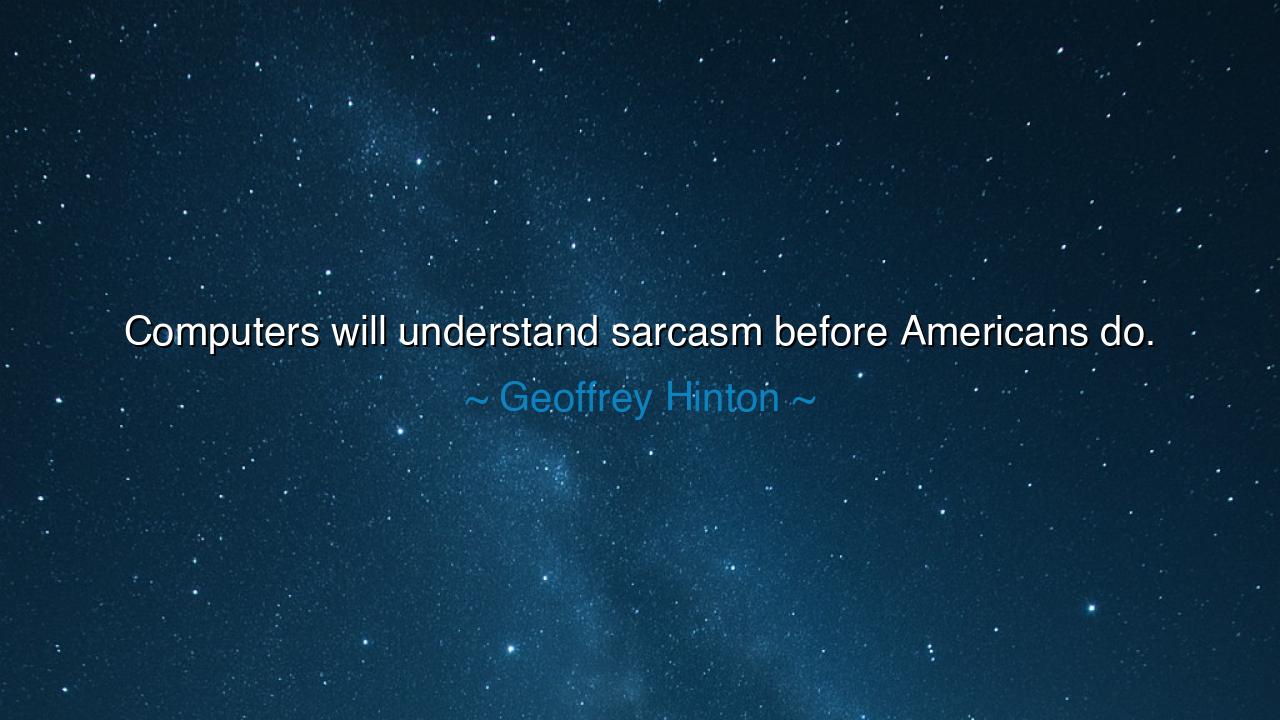
Computers will understand sarcasm before Americans do.






In the ever-advancing world of technology, we stand at the crossroads of a profound truth that has been echoed throughout the ages: human understanding is both complex and often elusive. The words of Geoffrey Hinton, "Computers will understand sarcasm before Americans do," are a biting commentary on the intricacies of human communication and the limitations of our own perceptions. In his statement, Hinton draws attention to the strange and ironic nature of sarcasm, a form of communication that often goes misunderstood, even by the most insightful and intelligent of people. Yet, in the age of artificial intelligence, machines—those creations once thought to be simple tools—are now beginning to master the subtleties of human speech in ways we might never have anticipated.
The ancients, in their pursuit of wisdom, understood that human nature is not easily deciphered. The Greek philosophers, such as Plato and Aristotle, spent their lives trying to understand the essence of human behavior and the complexities of language. They recognized that words, though powerful, are often veiled in layers of meaning. Just as Plato’s allegory of the cave illustrated the limitations of human perception, so too does Hinton’s observation reveal the struggle inherent in understanding each other in the modern world. Sarcasm, like the shadows on the wall of Plato’s cave, can be difficult to discern, leaving many to misinterpret or misunderstand what is being truly communicated.
Consider the example of Shakespeare, whose works are filled with layers of irony and sarcasm. The playwright’s ability to play with language and the complexity of human emotion was revolutionary. In his comedies, such as Twelfth Night, Shakespeare weaved sarcasm into the fabric of dialogue, often creating humor by presenting one thing while meaning another. But even in his time, sarcasm was a double-edged sword—those who did not understand the nuances of language could easily miss the underlying truth. The same is true today. Sarcasm is a powerful tool for communication, but it requires a depth of understanding that transcends mere words. Yet, Hinton’s statement suggests that machines—designed to process and interpret data—may be able to analyze and recognize these subtle cues faster than human beings can.
Hinton’s insight is not just about the evolution of computers or artificial intelligence, but about the very nature of human communication. In the modern age, we are bombarded with information and interaction in ways our ancestors never imagined. The social media platforms, text messages, and instant exchanges of the digital world have made it harder to interpret the tone, intent, and emotion behind every word. In the time of the ancients, communication was often face-to-face, and the speaker’s intent could be easily understood through body language and expression. Today, we hide behind screens, and sarcasm—one of the oldest and most complex forms of expression—has become increasingly difficult for both humans and machines to interpret.
The lesson in Hinton’s statement is a reminder of the ever-evolving relationship between humans and machines. In our quest for technological progress, we must remember that understanding is a multifaceted endeavor. Just as the ancients believed that philosophy and reason could guide humanity toward deeper understanding, so too must we recognize that artificial intelligence is merely an extension of our own humanity—tools we have created to navigate the complexities of our world. But the true challenge remains in understanding each other, not just through the precision of machines, but through the depth of our shared human experiences.
Consider the rise of artificial intelligence in the realm of language processing. Programs like Google’s natural language models and chatbots are now able to analyze sarcasm in text, detecting patterns of speech and context that might suggest irony or humor. However, this ability to understand sarcasm, while impressive, is still in its infancy. The true test will come when these machines can understand not just the structure of language, but the humanity behind it. Just as Socrates would challenge his students to look beyond the surface of their beliefs, so too must we challenge our machines to look beyond the surface of their programming and understand the deeper layers of human emotion and intent.
In practical terms, Hinton’s words call us to reflect on our own relationship with technology. While it is tempting to rely on machines to interpret the complexities of human speech, we must remember that empathy, context, and experience are qualities that computers will never fully replicate. As we move forward into an era where artificial intelligence plays an ever-larger role in our lives, we must ensure that we do not lose sight of the human element of communication. We must remain mindful of the complexities of sarcasm, emotion, and intention, and recognize that while machines may help us navigate these challenges, it is our shared humanity that ultimately gives meaning to our words.
Thus, the lesson from Hinton’s words is clear: technology is not here to replace us, but to aid us. As we continue to advance in the realms of artificial intelligence and language processing, we must not forget that the essence of communication lies in our ability to understand and connect with one another. While machines may one day grasp the nuances of sarcasm, it is up to us, as human beings, to ensure that we never lose the ability to truly listen, understand, and communicate with empathy and depth.






AAdministratorAdministrator
Welcome, honored guests. Please leave a comment, we will respond soon